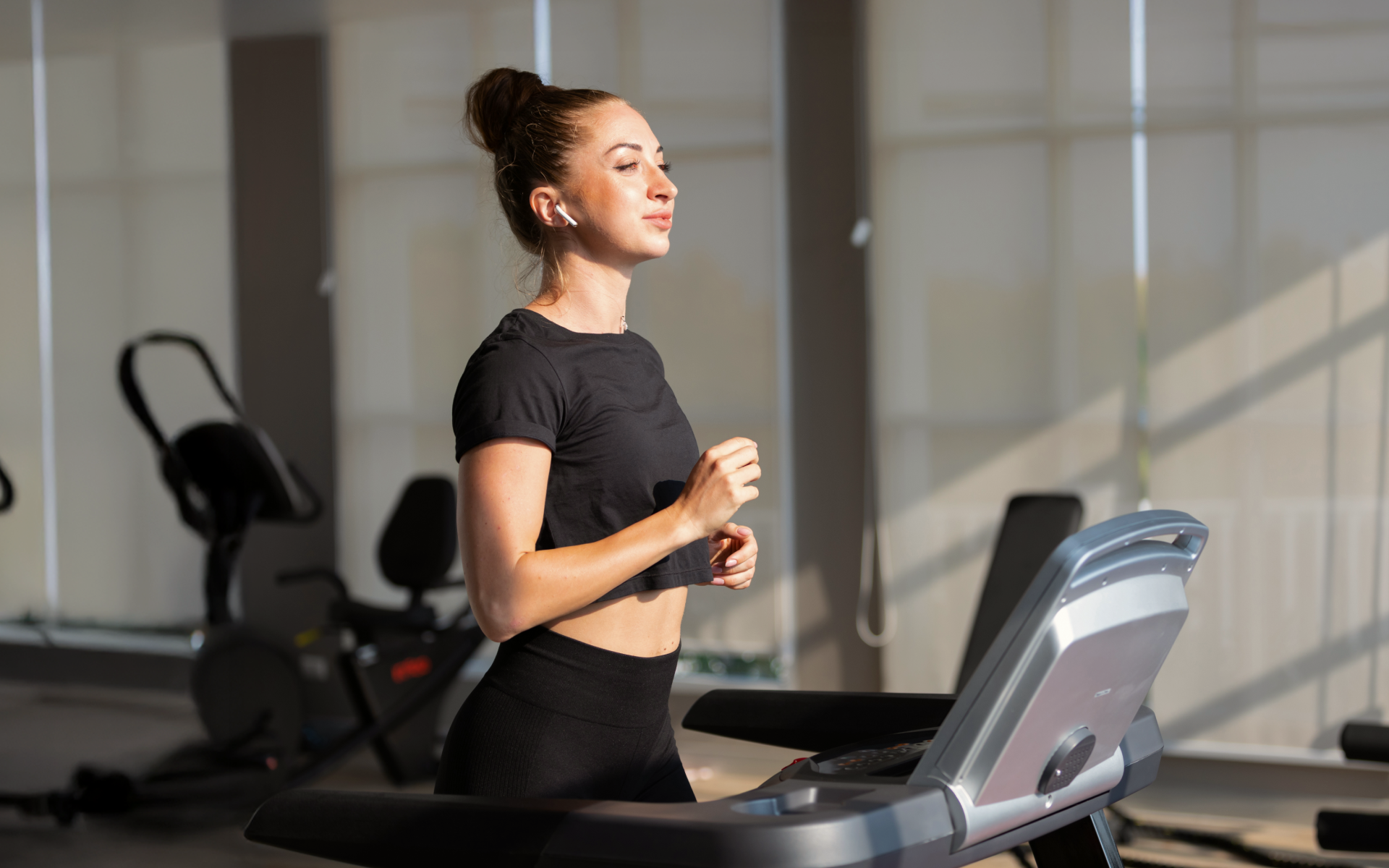Calorie counting usually comes into the spotlight when we’re actively trying to lose weight or improve our health.
You may wonder how many calories you burn when running, cycling, swimming, or even walking briskly without realizing that calories burned at rest also matter.
The truth is that you need to burn calories to function. Think about it – your body is like a machine that’s constantly working, even when you’re doing nothing. It needs energy to keep your heart beating, your lungs breathing, and your organs functioning.
This process, which is known as your basal metabolic rate (BMR), can account for up to 60 -75% of your total daily energy expenditure (18). So, let’s take a closer look at how many calories you burn in a day doing nothing and why this matters.
How Many Calories Do You Burn a Day Sitting Doing Nothing?
You will burn at least 1,300-2,000 calories by doing nothing (12).These calories are used to help your brain, heart, lungs, and other organs function properly (17). Sounds counterintuitive, right?
But stay with us – even someone in a coma burns a certain amount of calories a day. This is why patients in hospitals are fed intravenously to maintain their weight and health when they are bedridden.
The name that is given to the amount of energy your body needs to perform these basic functions is known as the basal metabolic rate (BMR).
If you tend to let yourself off the hook, raise the white flag when things get tougher than you expected, send yourself on an unconscious binge-eating trip – BetterMe app is here to help you leave all of these sabotaging habits in the past!
Now, the calories you will burn doing nothing aren’t exactly the same for everyone. There are several factors that can influence your BMR, including (16):
- Age: As we grow older, our muscle mass decreases, which means our BMR also decreases. This is because muscle burns more calories at rest than fat.
- Gender: Men tend to have a higher BMR than women because they generally have more muscle mass, which burns more calories than fat.
- Genetics: Some people naturally have a faster metabolism due to their genetic makeup.
- Body Size and Composition: People with larger body sizes or more muscle mass generally have higher BMRs.
- Climate and Body Temperature: Exposure to cold temperatures or a fever can increase BMR as the body needs to work harder to maintain its normal temperature.
- Diet: Certain types of food can temporarily increase BMR due to the thermic effect of food. For example,-protein utilizes more energy during digestion, leading to a small, short-term increase in metabolism.
- Physical Activity: Regular exercise can increase muscle mass, which in turn raises BMR.
- Hormonal Levels: Various hormones, such as thyroid hormones and stress hormones, can influence BMR.
- Health Status: Certain health conditions or illnesses, such as hypothyroidism or hyperthyroidism, can affect BMR.
- Pregnancy and Lactation: These states increase the body’s energy needs, which increases BMR.
By understanding these factors, you can gain a more nuanced perspective of your body’s caloric needs and how you may be able to modify your lifestyle or diet to align with your health and fitness goals.
You may also be interested in how everyday actions impact BMR: Calories Burned While Chewing Gum
How Many Calories Do I Burn an Hour at Rest?
You can burn anything from 50 to 150 calories an hour while at rest, depending on your age, gender, body composition, and other factors.
However, it’s important that you don’t equate resting with sitting or lying down all day. Even small movements such as fidgeting or tapping your feet can increase your energy expenditure by a few calories per minute.
For example, it has been found that people who fidget while they sit burn up to 350 more calories per day than those who keep still (4).
In addition, the type of food you eat can influence how many calories you burn when at rest. Eating certain foods temporarily raise your metabolism as your body works harder to digest them (5). Caffeine and coffee can also increase your metabolic rate short term.
Read more: Kimchi: Calories, Nutrition, and Health Benefits
How Many Calories Do You Burn Sleeping for 8 Hours?
The average person burns approximately 0.42 calories per pound of body weight per hour while sleeping. Therefore, an individual who weighs 150 pounds would burn, roughly 1 calorie per minute (13).
Further, they could expect to burn approximately 504 calories if they sleep for 8 hours.
However, the number of calories burned while sleeping can vary depending on factors such as age, gender, and overall health status. For example, younger people or those with higher muscle mass may have a slightly higher BMR during sleep.
In addition, your quality of sleep plays a role in the number of calories burned resting. Poor sleep or a lack of sleep can disrupt the hormones that regulate metabolism, potentially resulting in increased caloric intake and weight gain over time (20).
Can I Increase My BMR to Burn More Calories While Doing Nothing?
Yes, you can increase your BMR to a certain extent. The main way of doing this is by increasing your muscle mass (15).
Let’s get a little technical for a moment: muscle tissue is more metabolically active than fat tissue, which means that it burns more calories to maintain itself.
Therefore, if you have more muscle mass, your body will burn more calories, even when you are resting or sleeping.
The best way to increase muscle mass is through regular strength training exercises such as weight lifting. This can be done either at home or the gym with proper instruction and guidance.
Furthermore, eating enough protein can also help boost your BMR as it helps build and maintain muscle (7).
However, it’s important to note that significant changes in BMR will not happen overnight – it takes consistent effort over time before you will see any results.
In addition to increasing muscle mass, certain lifestyle factors can also temporarily boost BMR, including:
HIIT (High-Intensity Interval Training) Workouts
These workouts involve short bursts of intense exercise, followed by brief periods of rest. They are known to increase metabolism and BMR for a few hours after you complete your workout (11).
Diet
Your diet can influence your BMR and certain diets can temporarily increase or decrease it.
A diet that is rich in protein boosts the metabolic rate for several hours after eating due to the energy required for its digestion, absorption, and storage—a phenomenon that is known as the thermic effect of food (8).
Hydration
Remaining well-hydrated can have a positive impact on your BMR. Water-induced thermogenesis leads to a 30% increase in the metabolic rate after you drink 0.5 liters of water. This effect starts 10 minutes after consumption and reaches a maximum after approximately 30-40 minutes (21).
Sleep
A lack of sleep or an irregular sleep pattern can negatively affect appetite hormones and metabolic health, eventually leading to weight gain (20).
Stress
Chronic stress can impact hunger hormones, influence food choices and increase cortisol levels, leading to weight gain. Cortisol, in particular, is associated with fat storage around the midsection, negatively influencing body composition (3).
Temperature
Exposure to cold temperatures can increase BMR as the body works harder to maintain its normal body temperature. Shivering and non-shivering thermogenesis (heat production) can significantly increase the metabolic rate (14) (19).
BetterMe app is a foolproof way to go from zero to a weight loss hero in a safe and sustainable way! What are you waiting for? Start transforming your body now!
Coffee and Green Tea
Drinking coffee or green tea can temporarily boost your metabolic rate. These beverages contain caffeine, which have been proven to enhance thermogenesis and fat oxidation, thereby increasing metabolism (9).
Catechin, a component in tea, may also impact fat oxidation. Other drinks that burn calories include black tea and oolong tea.
Eating spicy food
Some studies have suggested that consuming spicy foods can temporarily increase BMR due to capsaicin, the compound that gives peppers their heat (10).
It’s important to remember that while these lifestyle modifications can boost your BMR, the effect is temporary and relatively small. The most reliable way of increasing your BMR in the long term is through regular strength training exercises and a healthy, balanced diet that supports muscle growth.
How Dieting Can Affect Your BMR
Extreme calorie restriction can result in a significant decrease in BMR, a phenomenon that is often referred to as “metabolic adaptation” (1).
When the body perceives a severe lack of food, it will slow down its metabolic processes to conserve energy for essential functions. This is why extreme dieting can often cause a weight-loss plateau, as the body is resisting further weight reduction as a means of preserving energy.
Furthermore, when the body is undernourished, it can start to break down muscle tissue for energy, which can further decrease BMR as muscle tissue is more metabolically active than fat tissue.
We discuss the relationship between dieting and BMR in more detail here: Eating Less Than 1000 Calories a Day and Not Losing Weight
Read more: Intermittent Fasting Macros – Managing Calories the Smart Way!
FAQs
How many calories do I Need to burn to lose 1kg?
It has been previously assumed that1 kg of body weight, equals approximately 7,700 calories. This comes from the general rule of thumb that 1 pound of body weight is equivalent to approximately 3,500 calories, and 1 kg equals roughly 2.2 pounds (6).
However, to achieve this total deficit, it’s typically advised to create a daily calorie deficit of 500 calories. Achieving this deficit with a balanced diet and regular physical activity is generally effective.
Does thinking burn calories?
Yes, thinking does burn calories! However, the number is not as high as you may expect. The brain makes up approximately 2% of a person’s weight but burns approximately 20% of a day’s caloric intake (2).
Complex cognitive tasks and problem-solving activities may cause a slight increase in calorie burn, but it will still be relatively small. You cannot rely on thinking as a weight-loss strategy.
Does fidgeting burn calories?
Yes, fidgeting can help burn extra calories. This is a concept that is known as non-exercise activity thermogenesis (NEAT), where even small, unconscious movements such as tapping your foot, shifting in your seat, or standing instead of sitting can contribute to your daily calorie burn (17).
However, while these small movements can add up, they are no substitute for regular exercise.
How do you lose weight passively?
Passive weight loss strategies involve making small lifestyle changes that can help burn more calories throughout the day. They can include standing more often, taking the stairs rather than the elevator, parking farther away from a building, or even cleaning the house.
Other strategies include drinking more water, sleeping well, and eating a diet that is high in protein and fiber, which can help you feel full for longer and reduce caloric intake. However, these strategies should complement, not replace, a healthy diet and regular exercise.
The Bottom Line
The number of calories you burn while at rest is essential for weight management, but it shouldn’t be the sole focus of your health journey.
You should focus on creating a healthy and balanced lifestyle through regular exercise, a nutritious diet, adequate sleep, and stress management as this will ultimately lead to sustainable weight loss and overall well-being.
DISCLAIMER:
This article is intended for general informational purposes only and does not serve to address individual circumstances. It is not a substitute for professional advice or help and should not be relied on for making any kind of decision-making. Any action taken as a direct or indirect result of the information in this article is entirely at your own risk and is your sole responsibility.
BetterMe, its content staff, and its medical advisors accept no responsibility for inaccuracies, errors, misstatements, inconsistencies, or omissions and specifically disclaim any liability, loss or risk, personal, professional or otherwise, which may be incurred as a consequence, directly or indirectly, of the use and/or application of any content.
You should always seek the advice of your physician or other qualified health provider with any questions you may have regarding a medical condition or your specific situation. Never disregard professional medical advice or delay seeking it because of BetterMe content. If you suspect or think you may have a medical emergency, call your doctor.
SOURCES
- Adaptive thermogenesis in humans (2013, ncbi.nlm.nih.gov) b
- Appraising the brain’s energy budget (2002, pnas.org) c
- A Review of Weight Control Strategies and Their Effects on the Regulation of Hormonal Balance (2011, hindawi.com) a
- Burning calories without exercise (2021, health.harvard.edu) d
- Caffeine and coffee: their influence on metabolic rate and substrate utilization in normal weight and obese individuals (1980, sciencedirect.com) e
- Counting calories: Get back to weight-loss basics (2023, mayoclinic.org) f
- Dietary Protein and Muscle Mass: Translating Science to Application and Health Benefit (2019, mdpi.com) h
- Diet induced thermogenesis (2004, ncbi.nlm.nih.gov) g
- Effect of a Thermogenic Beverage on 24‐Hour Energy Metabolism in Humans (2012, onlinelibrary.wiley.com) i
- Effects of Capsaicin and Capsiate on Energy Balance: Critical Review and Meta-analyses of Studies in Humans (2011, academic.oup.com) j
- Evidence-Based Effects of High-Intensity Interval Training on Exercise Capacity and Health: A Review with Historical Perspective (2021, mdpi.com) k
- How Many Calories Do You Burn In A Day? (2023, health.clevelandclinic.org) u
- How many calories do you burn Sleeping? (n.d., burned-calories.com) l
- Implications of nonshivering thermogenesis for energy balance regulation in humans (2011, journals.physiology.org) m
- Increasing muscle mass to improve metabolism (2013, ncbi.nlm.nih.gov) n
- Metabolism (2023, betterhealth.vic.gov.au) o
- Non-Exercise Activity Thermogenesis in Human Energy Homeostasis (2000, ncbi.nlm.nih.gov) p
- Revised Harris–Benedict Equation: New Human Resting Metabolic Rate Equation (2021, mdpi.com) q
- Shivering thermogenesis in humans: Origin, contribution and metabolic requirement (2017, ncbi.nlm.nih.gov) r
- The role of insufficient sleep and circadian misalignment in obesity (2020, nature.com) s
- Water-Induced Thermogenesis (2023, academic.oup.com)










